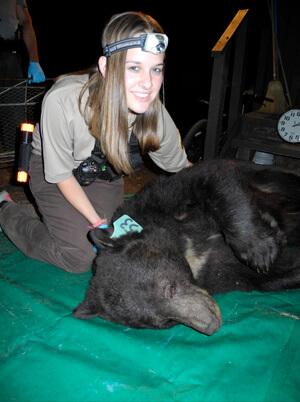Last summer, I was able to fulfill a childhood dream by working for Yosemite National Park’s Branch of Wildlife Management. Specifically, I helped to protect the park’s black bears by using negative conditioning to keep them out of developed areas and away from humans and human food. Ultimately, the goal was simple: keep bears wild. Negative conditioning practices included yelling, chasing, paintballing, and overall intimidation of bears that were unnaturally habituated, or used to human presence.
There were about twenty bears in the park that we monitored using tracking collars and radio telemetry. Some of the bears had obtained human food (usually from campgrounds or picnic areas, but sometimes in the backcountry), and others just frequented developed areas.
Though black bears are not aggressive animals, it is not safe or natural for them to be comfortable around humans. Bear encounters in developed areas can often end in property damage or other human-bear conflicts. When bears become too comfortable around people, accidents can happen and bears can be seen as a "threat to human safety." When this happens, these bears have to be euthanized, which nobody wants. Keeping bears wild requires proper food storage, telemetry to track the bears, the ability to educate and communicate effectively with the public, and hazing tactics for chasing bears out of developed areas.
Much of our work is preventative rather than reactive. If food is stored properly, bears will not receive a "reward" for entering developed areas, and will not have a reason to come back. Spotlighting the campgrounds and making sure bear lockers (bear-proof storage units for food and scented toiletries) were properly closed and latched, checking for food left out or too far from visitors, unclipped dumpsters (which bears could climb into), and other food storage violations were routine nightly duties. Sometimes, we captured bears to put collars on them, adjust their collars, or for other reasons. I was able to participate in one capture this season, and learned so much by being up close to the bear.
I gained invaluable experience and knowledge this summer from working alongside skilled and passionate field biologists and volunteers. I was able to build on my public speaking and interpretation skills as much of my work consisted of interacting with park visitors. I learned to adapt quickly to different situations, as wildlife can be unpredictable and things do not always go as planned. I learned to track animals using radio telemetry, haze bears and coyotes out of developed areas, take blood samples from a bear during a capture, and enter patrol data into a PDA.
I learned about the landscape of the park and the biology of the bears. I observed first-hand that each bear has a unique personality and can alter its behavior based on human presence. I saw how incredibly intelligent these animals are. I even got to learn about mountain lions from the head mountain lion and bear biologist for the California Department of Fish & Game, Marc Kenyon.
I had to step out of my comfort zone on numerous occasions—attending my first “Bear Briefing” on my own, and leading a talk on recent wildlife activity; navigating our huge pickup truck through campgrounds in the middle of the night; and seeing wildlife that had been hit by vehicles get shot on scene to be put out of their misery. The biggest thing I gained from this experience, though, was just learning that I have the ability to adapt to completely new places and experiences.
I now feel more comfortable accepting the fact that I am nearing the close of my educational career and getting closer to my entrance into the "real world." I still have two more years of school, but instead of fearing the fact that I don’t know what I will end up doing with my life, I am embracing the amazing experiences I have had, and looking forward to going new places and learning even more with each new opportunity. This internship also reaffirmed the fact that I would love to work with wildlife in some capacity.
My advice for future interns would be to be persistent in the application process and to go after what you really want to do. Make connections in the field and take advantage of every new experience.
